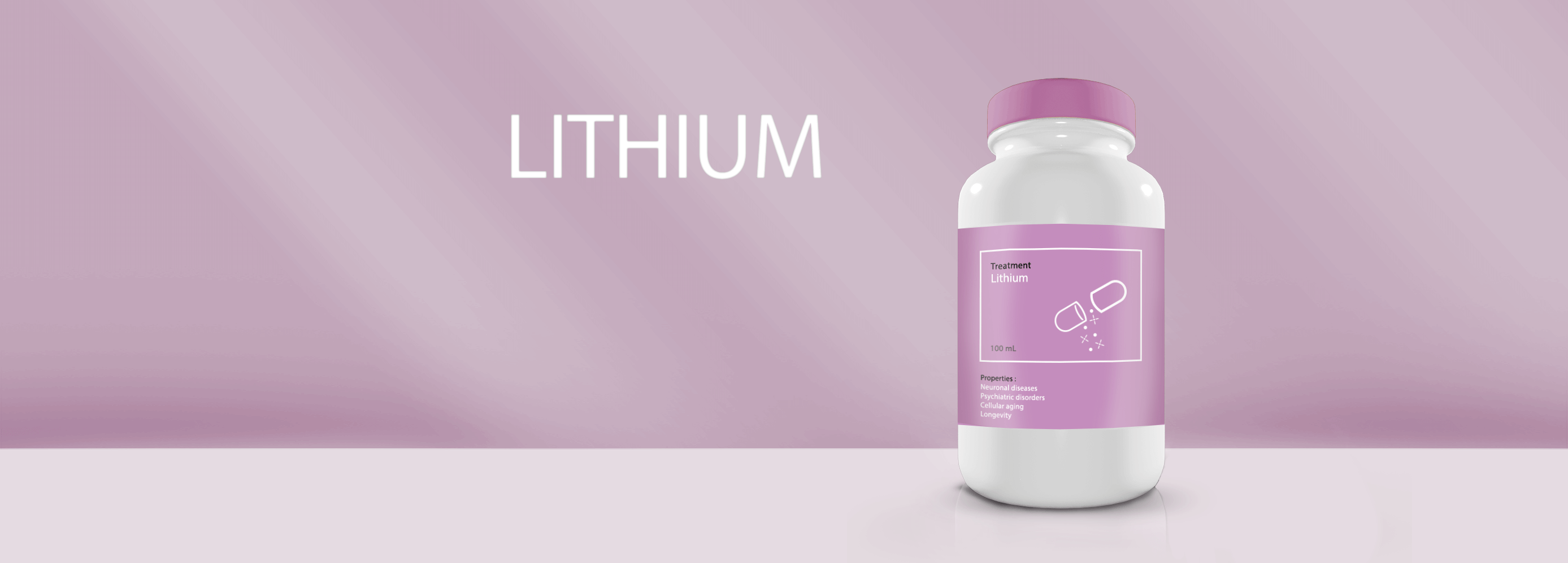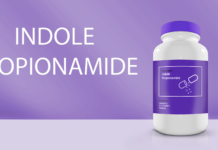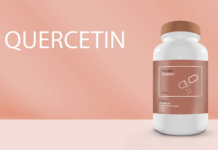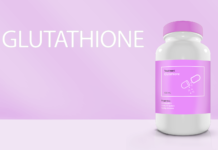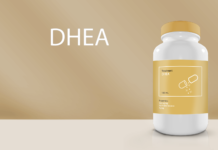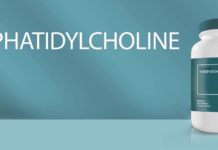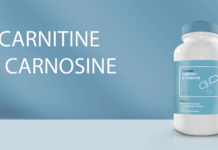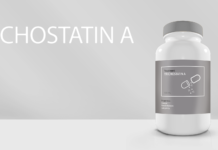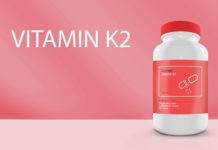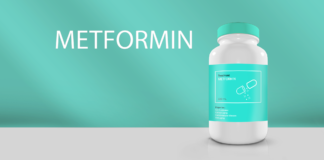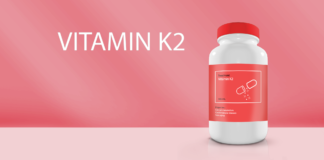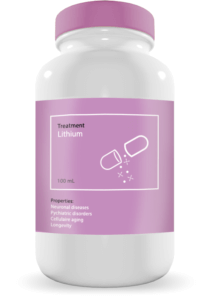
Fact sheet
Lithium: From thymoregulator to anti-aging agent
Lithium is used in medicine in the form of salt, the active ingredient of which is the Li+ ion. It belongs to the family of thymoregulators, or mood regulators. Initially a treatment against bipolar disorders and certain forms of schizophrenia, lithium is today the subject of high hopes in terms of the fight against aging.
Lithium: An ion against mood disorders and gout
Historically, lithium was used against gout and rheumatism, particularly in thermal cures or in the form of poultices. It was later proven that these remedies were full of common sense, lithium decreasing inflammation in the cartilage by impacting their response to cytokines, such as IL1β and NFκB[1]. For over 30 years, lithium salts have also been the first-line treatment for bipolar disorder. It is very effective in manic phases, reduces the amplitude of depressive phases and limits suicidal thoughts[2]. However, its mechanism of action is unclear and researchers are still trying to elucidate its role in these complex neural processes.
Lithium against aging?
It is by searching, that they found new applications for lithium. Indeed, it would seem that the telomeres of people taking low doses of lithium over long periods (more than 30 months) are about 35% longer, indicating protection against telomere shortening[3]. This effect was all the more important as the response to lithium treatment was good (without relapse or side effects). In the rat, a team began to provide elements of response in order to understand how lithium made it possible to modify the size of telomeres: it would thus seem that the upward regulation of the gene coding for telomerase, Tert, was involved, and that this mechanism would pass through the β-catenin[4] (see our work on telomeres).
Several studies have also been conducted in neurodegenerative diseases, proving that the action of lithium would pass through the inhibition of GSK3β. This enzyme, at the center of the canonical Wnt signaling pathway (a pathway involved mainly in cell differentiation and cancer), has a prominent role in neuroprotection and neurogenesis. When activated, it can trigger pathological phenomena leading to the occurrence of diseases such as diabetes, certain cancers and especially certain neurodegenerative diseases, such as Alzheimer’s[5]. Lithium, by indirectly causing its inhibition, reduces the risk of age-related diseases. At the same time, inhibition of GSK3β would also increase longevity in Drosophila[6].
In addition to its effect on GSK3β, lithium seems involved in specific phenomena of neurodegenerative diseases: it decreases amyloid in Alzheimer’s disease[7] and has a protective effect against Parkinson’s disease symptoms[8].
- Number of publications: over 4000
- Available molecule: on prescription
- Mode of administration: oral
- Dosage: in bipolar patients between 500 mg and 1.5 g / day. For an anti-aging effect, it would seem that a small dose between 20 and 50 mg / day is sufficient[9].
Possible Lithium-associated risks
Lithium should not be taken without medical advice. It is known for its beneficial effects but also has significant side effects. Among them, it is not uncommon for a patient to have dry mouth, digestive disorders sometimes accompanied by nausea or even speech difficulties. In these cases, it is necessary to discuss with your doctor to possibly adjust the daily dose or consider other medications that can reduce these side effects.
There is also a debate about the renal toxicity of lithium[10]. In patients with renal insufficiency, it is now advisable not to take high doses and possibly adjust treatment over time.
Finally, longevity enhancement studies were conducted in the C. Elegans worm, Drosophila, mouse and rat. At present, apart from the effect on telomere lengths, no studies have been validated in humans.
[1] Thompson CL, Yasmin H, Varone A, Wiles A, Poole CA, Knight MM. Lithium chloride prevents interleukin‐1β induced cartilage degradation and loss of mechanical properties. Journal of Orthopaedic Research. 2015;33(10):1552-1559
[2] Geddes JR, Burgess S, Hawton K, Jamison K, Goodwin GM, Long-term lithium therapy for bipolar disorder: systematic review and meta-analysis of randomized controlled trialls, Am J Psychiatry, 2004;161:217–222
[3] Martinsson L, Wei Y, Xu D, et al. Long-term lithium treatment in bipolar disorder is associated with longer leukocyte telomeres. Translational Psychiatry. 2013;3(5):e261
[4] Wei YB, Backlund L, Wegener G, Mathé AA, Lavebratt C. Telomerase Dysregulation in the Hippocampus of a Rat Model of Depression: Normalization by Lithium. International Journal of Neuropsychopharmacology. 2015;18(7):pyv002
[5] Jope RS, Yuskaitis CJ, Beurel E. Glycogen synthase kinase-3 (GSK3): inflammation, diseases, and therapeutics. Neurochemical Research. 2007;32(4-5):577–95
[6] Castillo-Quan JI, Li L, Kinghorn KJ, et al. Lithium Promotes Longevity through GSK3/NRF2-Dependent Hormesis. Cell Reports. 2016;15(3):638-650
[7] Sofola-Adesakin O, Castillo-Quan JI, Rallis C, et al. Lithium suppresses Aβ pathology by inhibiting translation in an adult Drosophila model of Alzheimer’s disease. Frontiers in Aging Neuroscience. 2014;6:190
[8] Lieu CA, Dewey CM, Chinta SJ, et al. Lithium prevents parkinsonian behavioral and striatal phenotypes in an aged parkin mutant transgenic mouse model. Brain research. 2014;0:111-117
[9] Nunes MA, Schöwe NM, Monteiro-Silva KC, et al. Chronic Microdose Lithium Treatment Prevented Memory Loss and Neurohistopathological Changes in a Transgenic Mouse Model of Alzheimer’s Disease. Holscher C, ed. PLoS ONE. 2015;10(11):e0142267
[10] Rej S, Elie D, Mucsi I, Looper KJ, Segal M.Chronic kidney disease in lithium-treated older adults: a review of epidemiology, mechanisms, and implications for the treatment of late-life mood disorders. Drugs Aging. 2015;32(1):31-42
Dr. Marion Tible

Author/Reviewer
Auteure/Relectrice
Marion Tible has a PhD in cellular biology and physiopathology. Formerly a researcher in thematics varying from cardiology to neurodegenerative diseases, she is now part of Long Long Life team and is involved in scientific writing and anti-aging research.
More about the Long Long Life team
Marion Tible est docteur en biologie cellulaire et physiopathologie. Ancienne chercheuse dans des thématiques oscillant de la cardiologie aux maladies neurodégénératives, elle est aujourd’hui impliquée au sein de Long Long Life pour la rédaction scientifique et la recherche contre le vieillissement.
En savoir plus sur l’équipe de Long Long Life


